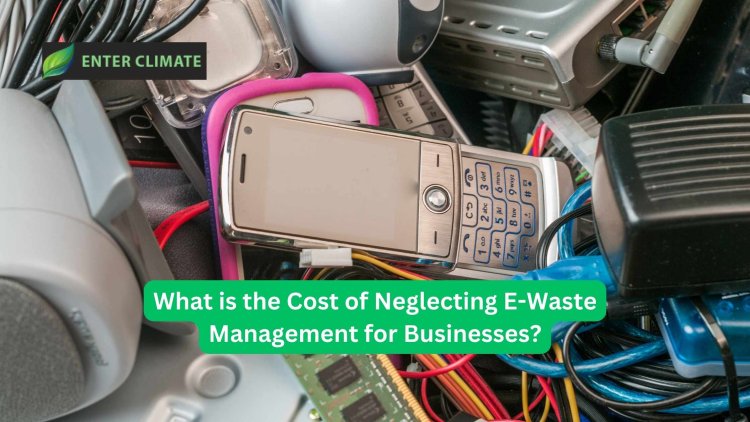What is the Cost of Neglecting E-Waste Management for Businesses?
Discover the hidden costs of neglecting e-waste management for businesses. Learn about financial, environmental, and reputational impacts, plus actionable solutions.
Share this Post to earn Money ( Upto ₹100 per 1000 Views )

n today’s digital age, businesses heavily rely on electronic devices to function efficiently. From computers and servers to smartphones and printers, technology drives productivity and innovation. However, with rapid technological advancements and shorter product lifespans, electronic waste (e-waste) has become a growing challenge. For businesses, neglecting proper e-waste management doesn’t just harm the environment; it also comes with significant financial, legal, and reputational costs.
In this blog, we will explore the risks and consequences businesses face when they fail to prioritize e-waste management and discuss actionable steps to mitigate these challenges.
Understanding E-Waste and Its Implications
E-waste refers to discarded electronic devices and components that are no longer functional or needed. These include items such as old computers, batteries, cables, and industrial equipment. E-waste is not just ordinary trash—it often contains hazardous substances like lead, mercury, and cadmium, which can harm the environment and human health if improperly disposed of. At the same time, e-waste contains valuable materials like gold, silver, and copper, which can be recovered through recycling.
For businesses, managing e-waste is not just about meeting sustainability goals; it’s also a matter of compliance and corporate responsibility. Ignoring e-waste can lead to severe consequences.
The Costs of Neglecting E-Waste Management
1. Financial Penalties and Legal Liabilities
India’s E-Waste Management Rules, 2016, mandate businesses to responsibly manage their e-waste. Companies must adhere to Extended Producer Responsibility (EPR), ensuring the collection, recycling, and safe disposal of electronic waste. Failure to comply can result in:
-
Hefty fines imposed by regulatory authorities.
-
Legal actions and lawsuits, especially if improper disposal leads to environmental damage.
-
Suspension of business licenses for repeat offenses.
2. Environmental and Health Damage
Improper e-waste disposal causes toxic substances to leach into soil and water, contaminating ecosystems and posing risks to nearby communities. Businesses that contribute to such damage may face public backlash, cleanup costs, and long-term reputational harm.
-
Environmental Impact: Polluted water bodies and degraded soil affect agricultural productivity and biodiversity.
-
Health Risks: Workers and local communities exposed to toxins suffer from respiratory issues, neurological disorders, and other health problems.
3. Loss of Valuable Resources
E-waste contains precious metals and rare earth elements that can be recycled and reused. By neglecting recycling, businesses contribute to resource wastage and increased mining activities, which further strain the environment and increase production costs for new electronics.
4. Reputational Damage
Modern consumers value sustainability and corporate responsibility. Businesses that fail to manage their e-waste risk damaging their brand image and losing customer trust. Negative publicity, especially in today’s digital age, can spread quickly and have lasting effects on a company’s reputation.
5. Missed Economic Opportunities
Recycling e-waste is not just about compliance; it’s also a potential revenue stream. Properly managing e-waste allows businesses to recover valuable materials, reduce costs, and even generate income by partnering with certified recyclers. Ignoring this opportunity results in financial losses.
6. Operational Inefficiencies
Accumulating outdated or unused electronics can clutter workplaces, reduce efficiency, and increase storage costs. Proper e-waste management ensures better resource utilization and optimized operations.
Why E-Waste Management is a Business Priority
Effective e-waste management aligns with the principles of sustainability, corporate responsibility, and long-term profitability. Here’s why businesses should prioritize it:
-
Regulatory Compliance: Staying ahead of regulations protects businesses from penalties and ensures smooth operations.
-
Cost Savings: Recycling reduces raw material costs and mitigates environmental cleanup expenses.
-
Customer Loyalty: Demonstrating commitment to sustainability builds trust and strengthens brand value.
-
Global Responsibility: Businesses play a critical role in reducing e-waste’s global impact and fostering a circular economy.
Steps Businesses Can Take to Manage E-Waste Responsibly
-
Implement an E-Waste Management Policy Develop clear guidelines for the collection, recycling, and disposal of electronic waste. Assign a dedicated team to oversee e-waste practices and compliance.
-
Partner with Certified Recyclers Work with authorized e-waste recycling companies that follow safe and environmentally friendly practices. These recyclers ensure proper dismantling and recovery of valuable materials.
-
Adopt Circular Economy Practices Design products for durability and recyclability. Implement take-back programs to recover old electronics from customers and recycle them responsibly.
-
Educate Employees and Customers Conduct training sessions to raise awareness about e-waste hazards and sustainable practices. Encourage customers to return end-of-life products through incentives or collection drives.
-
Leverage Technology Use software to track e-waste generation and disposal processes. This ensures better monitoring and helps in meeting compliance requirements.
-
Comply with E-Waste Management Rules Stay updated with regulatory requirements and ensure adherence to India’s e-waste laws, including EPR obligations.
Conclusion
Neglecting e-waste management is a costly mistake for businesses, both financially and ethically. Beyond regulatory compliance, managing e-waste responsibly helps businesses conserve resources, protect the environment, and build a strong reputation. By adopting sustainable practices, businesses can turn the challenge of e-waste into an opportunity for innovation and growth.
The time to act is now. Businesses that prioritize e-waste management not only safeguard their operations from legal and financial risks but also contribute to a sustainable future for all.
FAQs
1. What are the key components of an e-waste management policy for businesses?
An effective e-waste management policy includes guidelines for the collection, recycling, and disposal of electronic waste, partnerships with certified recyclers, and compliance with local regulations.
2. How can businesses benefit from e-waste recycling?
Businesses can recover valuable materials, reduce raw material costs, comply with regulations, and enhance their brand reputation through responsible e-waste recycling.
3. Why is e-waste management important for small businesses?
E-waste management helps small businesses avoid penalties, reduce costs, and build trust with environmentally conscious customers, ensuring long-term growth and sustainability.
















